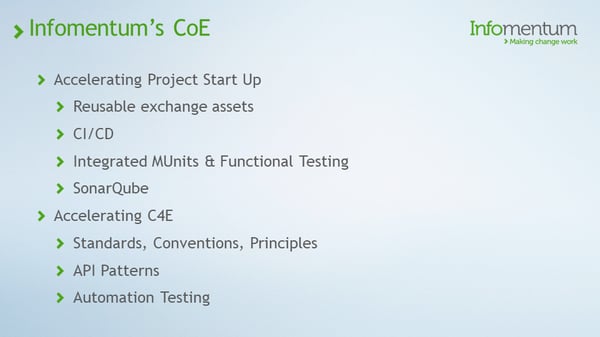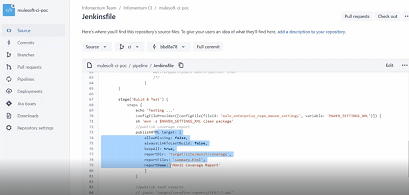VIDEO SERIES
How to accelerate API integration journey.
Episode 1
Acceleration Kit & Center of Excellence
A year ago we created a video series to help organisations start API adoption to achieve outstanding results and deliver business value. This year we focus on how to accelerate API-based journey. In the times when even traditionally conservative sectors are joining the digitalisation rush, businesses demand to see the impacts of their transformation programme in weeks not months. Faster beats stronger!
50 days of acceleration
As a part of the Integration Framework and Kick-start Integration Kit, all our customers get access to our extensive Knowledge Hub. The reusable assets and accelerators enable our clients to advance their projects and deliver results much faster.
In this video series, we explain what is included in the Acceleration Kit and how our Center of Excellence (CoE) helps give momentum to MuleSoft integration projects.
Through our CoE, we've created a centralised knowledge hub. It consists of various reusable assets to accelerate our clients' integration journey with MuleSoft. The hub includes elements for advancing our customers' API project delivery and their Center for Enablement (C4E) set-up. Reusable exchange assets, out-of-the-box CI/CD (continuous integration and continuous delivery) setup, integrated MUnits and functional testing, as well as quality checks with SonarQube, are used to optimise API projects.
Forming a strong C4E is crucial for the success of any MuleSoft integration programme. To ensure alignment on IT projects and strong central governance, we offer pre-defined API coding and naming standards, API versioning, conventions, principles, API patterns, automation testing and much more. All these elements can be taken off the shelf and quickly tailored to your specific requirements.

Jump-start project template
A reusable project template is used to define a new project's structure. Having a set of pre-defined standards helps developers start building APIs on the same footing and provide a vital level of consistency as more and more APIs are created.
Our Mule project template contains:
- a sample of API RAML files setup,
- a package structure for data types
- environment configuration files
- keystores for certificates
- an example of interface and implementation files
- a sample of ping endpoint implementation.
Using a project template also helps with knowledge transfer as everyone knows where to search for required files. When APIs are released to production, the support teams are aware of where to look if detailed troubleshooting and debugging are required.
API Design Fragments
Getting the API design right from the start is crucial. It involves understanding of what main resource paths are needed and how the interactions are envisaged with that API.
Standard Resource types
We've created a library of some of the standard resource methods (POST, GET, PATCH, PUT, DELETE) detailing the typical usage of these methods and the most common HTTP codes. These templates help accelerate the creation of the RAML specification and, in general, the design phase of your project.
Standard Header Traits
We also offer standard header traits, including some commonly used ones like the Accept and Cache-Control. These traits help speed up the production of the RAML specifications. These traits, along with the other exchange assets, help to standardise the production of RAML specifications across all your APIs, giving a level of consistency across the API network.
These reusable assets will kick-start your integration journey with MuleSoft and ensure higher quality and faster deliverables.


